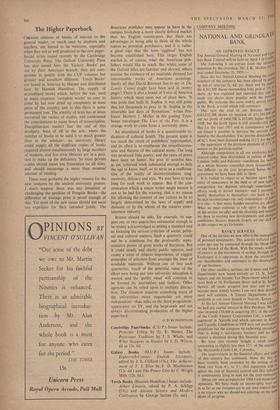The Higher Paperback
CHEAPER editions of books of interest to the general reader, or much used by students and teachers, are bound to be welcome, especially when they are as well produced as the new paper- bound series issued recently by the Cambridge University Press. The Oxford University Press has also issued here the 'Galaxy Books' put out by their American branch; they are com- parable in quality with the CUP volumes but glossier and somehow different. 'Torch Books' are issued in America by Harper and distributed here by Hamish Hamilton. The supply of secondhand books which, before the war, used to make sixpenny 'complete works' so easy to come by has now dried up completely in most parts of the country and in this there is some permanent loss. The scarcity of texts has at times narrowed the variety of studies, and condemned the conscientious to many hours of transcription. Disciplinarians needn't fear the end of this drudgery, least of all in the arts, where the number of books to be used is so much greater than in the sciences : no university library could supply all the duplicate copies of books required almost simultaneously by large numbers of students, and few civic libraries are in a posi- tion to make up the deficiency. So more private copies should mean less frustration on all sides, and should encourage a more than minimal amount of reading.
These were probably the higher reasons for the new ventures by the ancient university presses. I don't suppose there was any intention of challenging the position of Penguin Books—the difference of average price is proof enough of this. Yet most of the new issues should not seem too expensive for their intended public. The
American publisher may appear to have in the campus bookshop a more clearly 'defined market than his English counterpart. But there are advantages in being able to think of the whole nation as potential purchasers, and it is rather a good sign that the term 'egghead' has not become established here. This larger English market is, of course, what the American pub- lishers would like to reach. But whilst some of the Oxford titles are familiar and shrewd, others assume the existence of an insatiable demand for interminable works of American sociology. Surely all that David Riesman has to say in The Lonely Crowd might have been said in twenty pages? There is also a brand of Voice of America history which must seem out of place here. 'It was pride that built St. Sophia. It was still pride that led thousands to pray in St. Sophia in the miserable last days of Byzantium,' writes Pro- fessor Herbert J. Muller in his grating Toyn- beean travelogue The Uses of the Past. it is a strange work to come from a university press.
An abundance of books is a questionable in- dication of cultural health. The present spate is too much the result of publishers' opportunism, and its effect is to emphasise the miscellaneous- ness and flatness of the cultural scene. The long war produced little poetry, and the years of peace have been no better. No poet or novelist has, as yet, achieved work substantial enough to help the age to know itself, or to serve as a reaffirma- tion of the reality of disinterestedness, mag- nanimity, delicacy and style. We may have to wait long for such work to appear. But if the con- centration which a major writer might bestow is not to be had for the wanting, that is no reason for allowing the content of our culture to be so largely determined by the laws of supply and demand, or by the whims of the massive enter- tainment industry:
Britain should be able, for example, to sup- port one or two quarterlies substantial enough to be widely acknowledged as setting a standard and as focusing the serious criticism of social, politi- cal and cultural matters. Such a quarterly could not be a substitute for the profoundly repre- sentative power of great works of literature. But it, could steady and clarify public opinion, and create a sense of relative importance, or suggest principles of selection from amongst the mass of available materials. Without one or two such quarterlies, much of the potential value of the effort now being put into university education is wasted, and the 'public, mind' will continue to be formed by journalism and fashion. Other agencies can be relied upon to multiply distrac- tion. The situation requires something more of the universities—more responsible yet more independent—than talks on the third programme, appearance on TV, and the large-scale and not always discriminating production of the higher paperback.
G. D. KLINGOPULOS










































 Previous page
Previous page